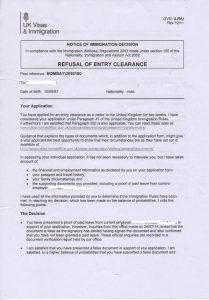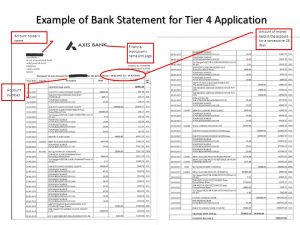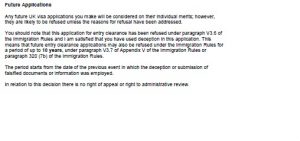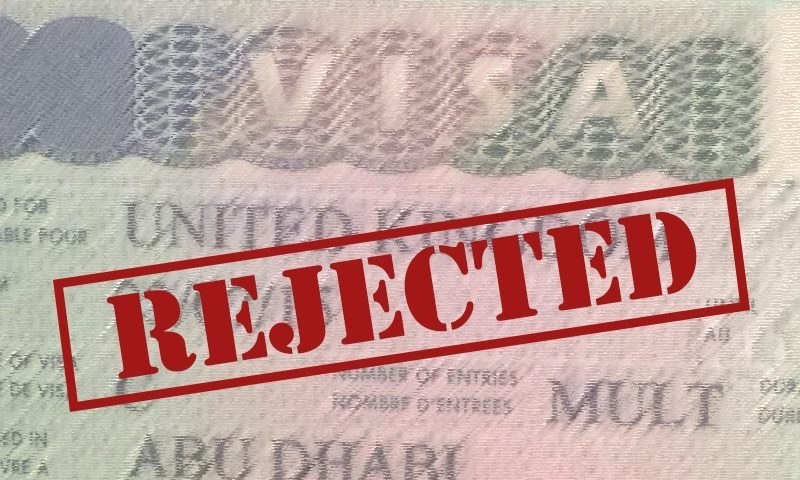UK is one of the most preferred destinations for international studies, every year around 4 million students go to the UK for their Higher Education. The universities in the UK are not only known for their high-class studies but also for rewarding infrastructures.
On the contrary, the visa application process is quite robust and laborious. However, the rate for rejections for Tier 4 is not very high. The year 2018, reported a 9.67% refusal rate.
When applying for college/university, visa rejections are one of the primary concerns of the applicants. Since 2015, Tier 4 General Student visa rejections rate had been very high. This ruffled feathers for many countries and initiated a very upfront debate. However, after an ultimatum given by India over a post-Brexit deal UK government has to loosen up their rules in 2018.
This also was beneficial for students as it allowed the students to switch to Tier 2 (skilled worker visa) as soon as they complete their course, and not will till their degree to end. This translation proved very beneficial to the students as it leads to finding sponsored employment as soon as they get over their course.
Despite these positive switches, student visas are still refused. And to make sure that you don’t fall in that 9%-10 % of rejection cases, we will be discussing the common reasons for refusals. So, when applying keep these in mind and you are ready to sail.
The quality of your application lies in the integrity of your intent to study abroad, the ability to provide essential documents of proof, and your confidence in clearing the interview round.
Poorly filled form
The visa application form is the first step of your process, and one of the very important documents. It is very vital to enter all the information correctly. A number of applications are refused because the given information was incorrect, such as your passport number, CAS information, date of birth, etc.
The information provided in the form is very critical and holds a say in your rejection or acceptance. So double-check each section thoroughly to save yourself from later disappointments.
Missing Documents

The most common reason for refusal of a visa is missing or incorrect documents. Failure to submit or attach a required document could lead to rejection and unfortunately, you will have to start from square one.
Make a list of all the required documents, make sure they all are translated in English and arranged in ascending order, before submission. The most reliable source of information about the UK visa is the Tier 4 student visa policy guidance, you can find the link attached at the end of this article. This document will provide you with a complete list of documents that you need to arrange. Follow these guidelines to make sure your application is efficacious.
All the documents attached must be original, scanned. If in any case, you don’t have an original document, provide them with a copy mentioning the reason for doing so or enclosing a supporting document to support your statement.
Failure to meet financial requirements/evidence

As I have already discussed, the UK follows a point-based visa system. And under this system, an applicant has to meet given financial requirements. Failure to do so can result in visa rejection.
As per the policy, every student has to provide proof through a bank statement or financial sponsor that he/she can cover their tuition and living expenses in the UK (up to 1 year). The link that is attached below also includes information on how to do calculations for your own case. These rules are also followed by your immigration officer, so make sure the calculations are accurate. That specified amount of money has to stay in your account for at least 28 days, not even a day less.
Missing bank statements or incomplete information from your financial sponsor can lead to upright rejection.
Incorrect Document Format
Often times students fail to comprehend the importance of format in the documentation. Each document should be translated into English, must show a date, signature, name, and contact details of the translator. If a translation is missing on a date or any other detail your document will be considered unacceptable.
Making a visa application, every detail is important including the format.
Deception

In any given case if the home office finds out that you knowingly or unknowingly provided information that is not accurate, or correct you can not only risk a refusal but even country ban of up to 10 years.
In any circumstance, interviews or forms don’t fib or provide partial information. Visa applications are dealt in a very vigilant way and any discrepancy found can lead to serious repercussions.
Interview
Clearing your interview is more of a subjective reason that you might get a rejection on your visa. Previously Tier 4 visas were strictly point-based, provided that you submit all documents and gain a sufficient amount of points, the visa was automatically issued.
However, later the rules changed and now candidates are interviewed, the main purpose of this interview is to check the genuineness of the student. An immigration officer decides whether a student wants to go for solely studying and not any other reason.
The interview is conducted in English via telephone or video link. A series of questions are asked regarding the course of study, the institution plans after graduation, finance. The immigration officer also looks for a specific level of English skills.
You need to confident and be prepared. Research as much as you can about your course and university. Brainstorm all the answers and reasons for common questions. Make sure you give to the point answers and not indulge in irrelevant explanations.
Administrative Review
It is a process by which students applying for entry clearance can challenge an eligible refusal decision on the base that the verdict is unfitting due to a case working error. You can apply for administrative review either you are living inside the UK or out of the country.
If UKVI issue a rejection to your Tier 4 Student Visa, it must issue a written notice with reference to your eligibility for Administrative Review. The notice will consist of the reasons for refusal. Guidelines about how to apply for Administrative Review and the deadlines for making an application will be provided by UKVI.
In the case that if you are outside the UK and intend to apply for an administrative review, you will have 28 days to make an application. 14 days if you are residing in the UK. These timelines are strictly observed to make sure they are taken seriously. UKVI can give leverage on a deadline in a few cases, depending on the reason for a late submission. The decisions to do is entirely in the hands of UKVI.
Your administrative review must include the reasons that were mentioned in your decision letter and put forward your reasons that why do you think it was a mistake, secondly send your completed form in the method that is required i.e. post, email, or in person.
Casework errors that can be challenged by an administrative are, not calculating the number of eligible points precisely. By not providing supporting documentation, and failing to apply guidance laws correctly.
Lastly, don’t let your dream of studying abroad sink in just because you were not attentive towards your application form. You can seek legal advice if you are convinced that your application was error-free. It will help you in your administrative process. Don’t forget to seek expert advice in these matters, rather than asking from amateurs, consider consulting experts.
.

